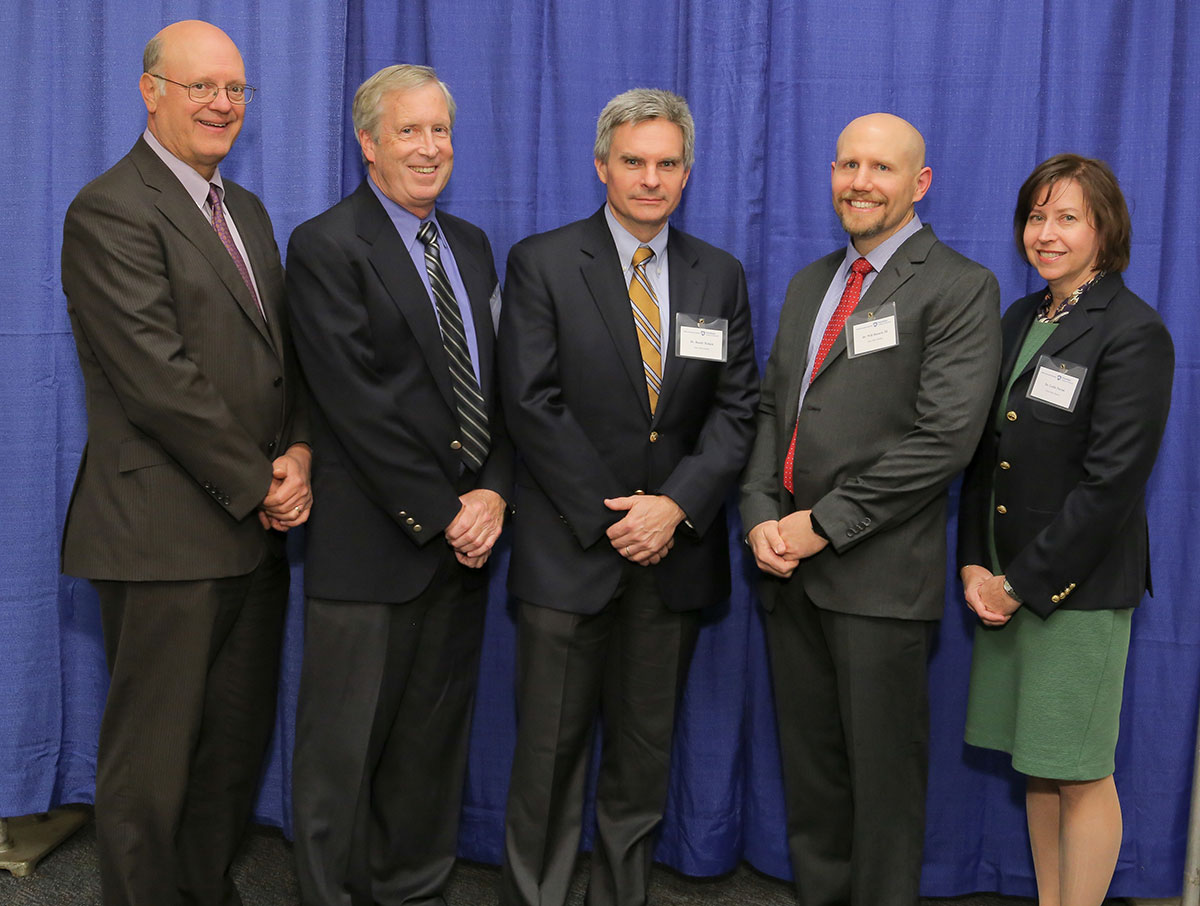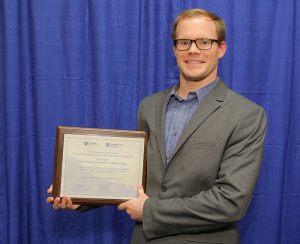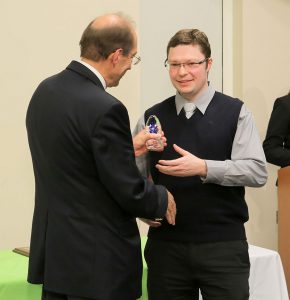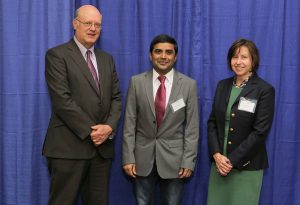2016 Innovation Awards honor students and faculty pursuing new technologies

The annual Innovation Awards event at Penn State College of Medicine recognizes faculty, staff, postdocs and students in the innovator community. Individuals are recognized for moving their innovations forward by executing a licensing agreement, earning a patent or starting a company based on Penn State technology during the preceding year. This year, the sixth annual Innovation Awards ceremony was held Oct. 27, 2016.

Pharmacology department PhD student Sam Linton was recognized at the 2016 Innovation Awards.
Members of the Office of Technology Development honored investigators around the College for their innovative work. According to Erika Swift, MBA, interim director of the Office of Technology Development, six patents were issued during the 2015-16 fiscal year, and four technologies were licensed to industry.
Pharmacology department PhD student Sam Linton was recognized for his service to support commercialization and the research enterprise at the College of Medicine and Hershey Medical Center.
Finally, awards were presented in three categories that had been open to nominations from across the College.
2016 Student Award for Excellence in Innovation

Yan Leyfman received the 2016 Student Award for Excellence in Innovation.
Two students were nominated for this year’s award, Yan Leyfman and Oliver Mrowczynski. Yan Leyfman was the 2016 recipient of the award.
From his nominator’s letter: “Yan is an extremely motivated and diligent, with the dedication to inspire change. Upon re-establishing the Hematology-Oncology Interest Group, he has led a transformational movement of the club. To expose students to the various oncological sub-specialties, Yan started a Career Exploration Lunch Lecture Series. Yan’s leadership, devotion, and desire to innovate were recognized when his group became the first cancer student interest group in the country, and one of only 32 groups nationally to receive accreditation from the American Society of Clinical Oncology. I am proud of the strides that this group has taken under Yan’s leadership, but like a true entrepreneur, Yan always strives to innovate, and I can only imagine the success that this group will achieve in the coming year.”
2016 Investigator to Watch Award

At the 2016 Penn State College of Medicine Innovation Awards, Dr. Raghavendra Gowda was named the 2016 Investigator to Watch. Gowda is pictured with A. Craig Hillemeier, MD, dean of Penn State College of Medicine and CEO of Penn State Health, and Leslie Parent, MD, vice dean for research and graduate studies for the College.
The nominees for this award were Dr. Steven Hicks, Dr. Jim Song, Dr. Raghavendra Gowda, and Dr. Elias Rizk. Dr. Raghavendra Gowda was the 2016 recipient of the award.
Dr. Gowda’s outstanding success in cancer research includes:
- More than 30 scientific publications
- Two issued patents
- More than half a dozen provisional patent applications
- A licensed technology that the licensee is progressing toward IND submission
- Collaboration with several companies, including Cipher Pharmaceutical, AstraZeneca and Charles River
- Countless internal and external grants
- An important role in generating data for, and contributing to, production of grant applications that resulted in an award of more than $4.5 million dollars
2016 Innovator of the Year Award
The culmination of the Innovation Awards ceremony is the announcement of the Innovator of the Year Award. This prestigious award is given to a faculty member who has been recognized by peers for a demonstrated track record of innovation; developing new technologies, processes or services; taking an entrepreneurial approach to translational research; and as a collaborator and active participant in the innovation community.
This year’s nominees were Dr. James Connor and Dr. Will Hazard. The 2016 Innovator of the Year recipient was Dr. Will Hazard.
Dr. Hazard has formed a start-up company, inTRAvent Medical LLC, to develop his idea, under a pending patent application.
Dr. Hazard was able to refine his innovative concepts and to solve a critical clinical need through various phases of development and execution. These phases were honed by his extensive work interviewing countless individuals in the medical community to define the needs of his target customers and significantly improve patient outcomes.
After winning proof-of-concept awards and raising several rounds of seed funding, Dr. Hazard engaged several engineering groups inside and outside of Penn State to develop the needed technology to make his vision a reality.
In addition, shortly after founding inTRAvent Medical, Dr. Hazard assembled a management team, secured financing and engaged legal and market development support with the goal of having a viable, FDA-approved product to market within 48 months.
If you're having trouble accessing this content, or would like it in another format, please email Penn State Health Marketing & Communications.
